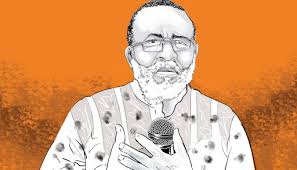
WYCLIFFE MUGA: Nobody likes Kenyans
Kenyans are more likely to win a global electoral contest than a purely African one.
How did any of the reported 11 million undocumented immigrants in the US manage to stay there?
In Summary
 WYCLIFFE MUGA/ STAR ILLUSTRATION
WYCLIFFE MUGA/ STAR ILLUSTRATION
Roughly 12 years ago, I met a Kenyan who had lived in the US as an undocumented immigrant for about 10 years, but had thereafter managed to regularise his status and proudly showed me his American passport.
This is how it happened:
I was at Boston’s Logan Airport, waiting for my flight to be called and was sitting next to a man who wore a cap with unmistakably Kenyan national colours. And so we got talking.
He had travelled to the US on a student visa about 10 years ago, leaving behind a wife and three children.
The man took on all kinds of odd jobs, often working two shifts a day, to be able to send money back home.
He also managed to set aside money to undertake evening classes, to train as a dental technician (which is to say, that he was not a fully qualified dentist but just someone who helped the dentist with his work).
In all that time, he did not dare travel back home to Kenya, as his passport would have been marked at his point of exit, with whatever words they use to state, “This man has been living illegally in the US and should not be allowed to return.” He also explained that once your Kenyan passport had that mark, you would have little chance of ever getting a visa to any European country as well.
His wife visited him in the US a couple of times. But in all that time, he never saw his children.
As I never felt the smallest urge to settle in the US, despite my many trips there, I simply could not understand the sacrifice he made to stay there, when he had a family, which he was utterly devoted to, still living back in Kenya.
But he did not find it odd at all. According to him, the salary he earned and the amounts he subsequently sent back home miraculously improved his family’s life.
They lived in their own house, fully paid for, not burdened by a mortgage. His children attended private boarding schools and excelled academically. He also kept his ageing mother well supplied with medicines and other needs.
No job he could have got in Kenya would have made any of these things possible, not even if he had gone all the way up to a Master's degree.
I then asked him something I had often wondered about, because I was one of those Kenyans who, when in a foreign country, always had my passport with me, in case a need to identify myself and prove that I was in that country legally should arise.
How had he lived in the US for so long without proper documents? Indeed, how did any of the reported 11 million undocumented immigrants in the US manage to stay there month after month and year after year, if they had no documents to show to the police if they were stopped on the street?
My newfound friend laughed and answered me with a question: Given I had told him I frequently travelled to the US and had once spent a full academic year there as a visiting scholar, he asked me to tell him how many times I was stopped by the police and asked for my passport or other form of ID.
The answer, of course, was that it never happened, not once. I even, on a number of occasions, asked a policeman for directions and he courteously pointed me in the right direction. Never once was I asked for proof that I had a right to be in the country.
Considering how the Trump presidency has now put the fear of God into migrants currently living in the US, whether legally as students who had received a visa from the US Embassy in their country of origin, or illegally, as was the case of my friend at the Boston Logan airport waiting area, I think I can say those days when, provided you managed to get into the US, you could somehow work your way into legal residency, are now over.
And the flood of US dollar remittances flowing into Kenya to pay medical bills, build houses and otherwise make life more comfortable for those who had families in the US, may soon be nothing more than a distant memory.
Incidentally, from the moment we were asked to board at Logan Airport, I lost sight of my new friend and never saw or heard from him again.
These friendships formed while waiting to board a flight in foreign countries rarely last beyond that initial conversation.

Kenyans are more likely to win a global electoral contest than a purely African one.